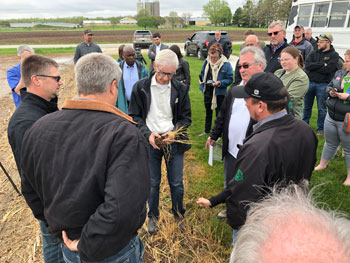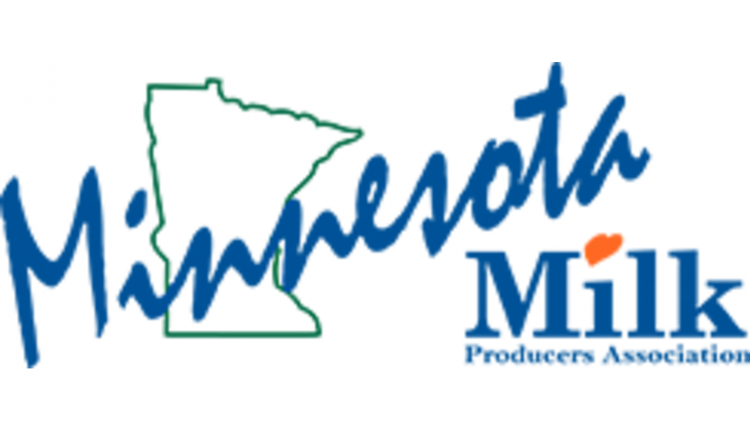
During his first State of the State speech in January at the state Capitol, Gov. Tony Evers declared 2019 would be the “Year of Clean Drinking Water” in Wisconsin.
On May 28, Evers stood on the edge of a farm field in Kewaunee County holding a clump of winter rye grass and soil. The plant is used as a cover crop at Deer Run Dairy to improve the health of the soil, keep it from eroding and hold manure fertilizer in place for the plants and out of lakes and water wells.
After listening intently to farmers and agronomists explain the benefits of cover crops and a manure digester at the farm, Evers seemed impressed.
“From contaminated wells to lead services lines, we’ve got to do more to improve Wisconsin’s water infrastructure,” he said a day later. “Peninsula Pride Farms’ Deer Run Dairy is proof that we don’t have to choose between supporting farmers and keeping our water clean.”
Duane Ducat operates the dairy with his son, Derek Ducat, and neighbor Dale Bogart. The trio milks 1,500 cows and runs 2,500 acres in the area with the help of 32 employees. Conservation has always been part of the plan for the farm, Duane emphasized.
“I think it was important for (Evers) to visit because he’s hearing our story,” he said. “He’s hearing what we’re doing to work with the community and making sure that our water stays clean.”
FINDING SOLUTIONS
Kewaunee County has had water quality issues for decades. Shallow soil depths in certain areas and fractured bedrock make the ground water susceptible to contamination from cow manure, which is spread on fields as organic fertilizer, and human waste from homeowners’ septic systems.
To address agriculture’s role, in 2016 local farmers and agribusiness professionals created Peninsula Pride Farms, a nonprofit watershed conservation organization in Kewaunee and southern Door counties. The group promotes and implements innovative conservation practices and technologies to protect surface and groundwater. Deer Run Dairy is one of about 50 members of the group.
Don Niles, a dairy farmer in Casco and president of Peninsula Pride Farms, was excited to have Evers visit.
“We’re delighted to have the governor out here,” Niles said. “There are a lot of good things happening up here on the peninsula. We’re having some impact with the different practices we’re trying and with the communication –– we’re trying to more effectively communicate with our non-farm neighbors.”
Deer Run’s digester was installed in 2011 after the farm had grown to a size that made an expensive digester economically feasible. The digester reduces manure odor, produces electricity, creates comfortable bedding for the cows and decreases pathogens in the manure. The pathogen reduction –– by a thousandfold –– effectively means manure from the 1,500 cows amounts to that coming from 1½ cows.
The less-potent liquid manure can be spread on crops throughout the summer without burning the plants.
“We can put manure out when it’s not as susceptible to runoff (or getting into ground water),” Duane Ducat said. “If you apply in the summertime when it’s dry, that really helps. It’s best if the manure is coming in as the chopper is leaving the field.”
COLLABORATIVE EFFORTS
State Rep. Joel Kitchens, a Republican from Sturgeon Bay, suggested that the Democratic governor see firsthand the innovative practices Peninsula Pride Farms members are using to protect and improve water quality. Niles was thankful because the visit provided not only an opportunity to showcase innovation but also to gain input from the governor.
“This is all very encouraging to us because here we have two different political parties working together to support what Kewaunee County farmers are doing to take care of the environment,” Niles said.
Kitchens was happy with the visit and impressed by the results coming from local farmers. He said producer-led watershed grants from the state during the past few years have helped farmers make progress. Last year, 19 groups were awarded a total of $558,246 through the Department of Agriculture, Trade and Consumer Protection program.
“Producer-led watershed grants are the best way we can spend money to improve the water quality situation,” Kitchens said. “There’s a lot of really good work happening in Kewaunee County; most of that is due to the fact that the levels of government have worked together and continue to make farmers welcome at the table. That’s the philosophy I’d like to see across the state going forward.”
Barry Bubolz of the U.S. Department of Agriculture’s Natural Resources Conservation Service, who advises the farmer-led group, was grateful for the chance to share with Evers the effective results in the region.
“If we get the opportunity to show other farmers, non-farmers and lawmakers the positive aspects of cover crops and how cover crops can improve soil health and also protect water quality,” Bubolz said, “those are great opportunities to spread that message.”
Empowering farmers to innovate is critical to continuous improvement on water quality, said Tim Trotter, executive director of the Dairy Business Association, which closely supports and promotes the work of Peninsula Pride Farms and several other similar organizations, including Yahara Pride Farms in south-central Wisconsin, Lafayette Ag Stewardship Alliance in the southwest and the Western Wisconsin Conservation Council in the northwest.
Trotter said it’s also important to engage with lawmakers and regulators –– something his association does on behalf of its member farmers and the businesses that support them throughout Wisconsin.
“We know farmers want to be, and are, part of the solution,” Trotter said. “Having them at the table as leaders of the discussion will bring about better outcomes for both the environment and farmers’ businesses. That’s why it was so exciting to see the interaction at Deer Run Dairy.”
About Peninsula Pride Farms:

Peninsula Pride Farms was established in March 2016 as a nonprofit organization. The goal of its dairy and crop farmers and corporate members is to leverage the ingenuity of the agricultural community, university research and scientists to protect ground and surface water in Kewaunee and southern Door counties in Wisconsin through innovative conservation practices and technology. For more information, visit peninsulapridefarms.org


